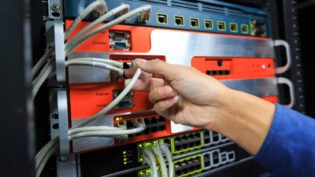How Will 5G Improve Telecommunications Across the Board?
By: Scott Resnick

News about the coming 5G network rollout has been buzzing for quite some time, but how different will it really be? How will it impact business telecommunications? As a business owner, it is important to understand what’s coming and be prepared for the change.
What Is 5G?
5G is the designation given to the next version of wireless technology being used to connect people using mobile devices such as smartphones, tablets, and laptops. It will be increasingly used to connect a myriad of devices and equipment, from autonomous vehicles to sensors and other gadgets in the Internet of Things or IoT.
The 5G system will be superior to previous generations but it also won’t be compatible with previous technology standards, meaning older phones won’t connect to the newest network or be able to take advantage of the latest improvements. Expect a minimum speed of 1 Gbps, and up to 10 Gbps, as reported by Network World
What Are All These Gs?
The “G” in 5G refers to generation. Basics of the first four generations of wireless telecommunications:
- 1G: analog cellular
- 2G: first digital cellular technology
- 3G: technology such as EVDO and HSPA to increase speed above 200kbps
- 4G: current system, advancing from megabits to gigabit speed
What Steps Are Being Taken to Make 5G Possible?
Major telecommunications providers are working on 5G. AT&T has announced it will offer the first mobile 5G service in the United States, with a plan to launch a network over 12 cities before the end of 2018, according to PC Magazine.
T-Mobile is also working on a system, aiming to launch a 5G network across the entire United States beginning in 2019 (full coverage is anticipated in 2020). Sprint announced it will deploy 5G in late 2019, according to ECN.
What’s more, Verizon has also announced a system for fixed 5G home internet service, to be deployed in three to five cities sometime in 2018, with Sacramento, California serving as the pilot city. Verizon’s solution will rely on a network of fixed home routers and is not intended for mobile usage.
The usage of these nascent 5G networks will depend on the availability of 5G compatible smartphones. Qualcomm indicated it will have 5G phones available to sell, but not until 2019. With no 5G phones available for AT&T’s launch, they will be relying on a mobile hotspot device for customers to use in the meantime.
What’s the Difference Between 5G and 4G?
There are three main components of 5G: The new system will allow for higher speed to transmit more data, it will be faster, and have lower latency for improved responsiveness. It will be able to connect many more pieces of equipment, from phones to computers to smart thermostats, security cameras and other IoT devices.
Higher speeds mean that your company will be able to transmit larger amounts of data in the same amount of time than when using an older 4G system.
Lower latency means that Software as a Service will be convenient to work with, to be sure, but it also means that consumer services will be richer and more responsive, especially when you consider virtual worlds and augmented reality.
Finally, unlike 4G networks that support thousands of connections, with 5G, your organization will enjoy as many as a million connections per square kilometer (essential for anyone working with IoT devices). This will help with the interconnectivity of everything and the increased level of traffic that your data lines will see.
Anticipated Effects of 5G in the Office as Well as In Personal, Everyday Life
5G will improve mobile networks – it will make your data move quicker, allowing team members to send texts faster and communicate better since calls will be crisper and clearer.
It’s worth noting that 5G will usher in a new era where the following network generations will be much easier to build off of each other, making the system more adaptable and lessening the number of devices rendered obsolete with each update.
From a business mobility perspective, upgrading your organization’s system to 5G will be crucial for maintaining connections and communication between workers as well as with customers, clients and vendors. As you prepare for an upgrade, strive to form a partnership with telecommunications professionals with expertise and experience in this area. TTI will make deployments smooth and efficient for Houston area businesses.












